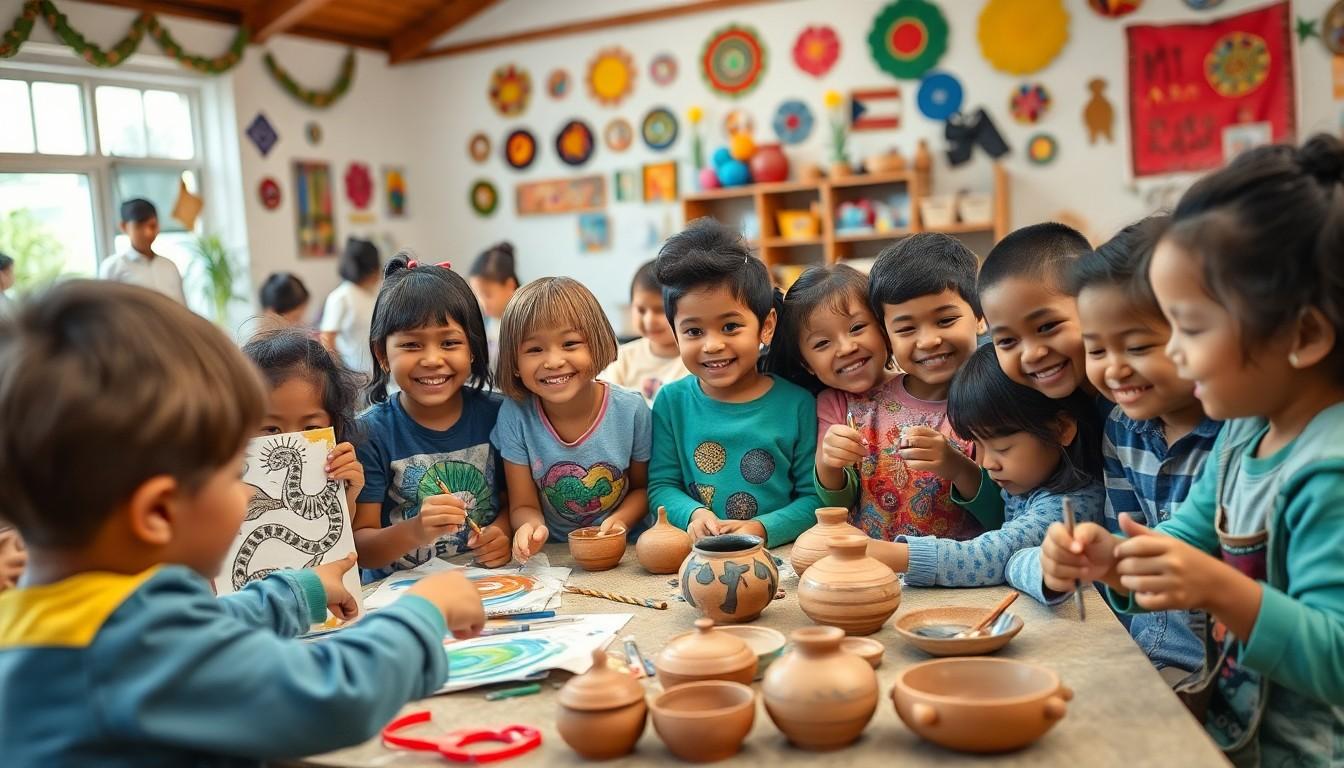Table of Contents
ToggleIn a world where screens often steal the spotlight, it’s time to bring back the magic of culture for kids. Imagine little ones diving into vibrant traditions and exploring the rich tapestry of global customs—all while having a blast! Culture activities not only spark curiosity but also serve as a passport to understanding diversity and creativity.
Overview of Culture Activities for Kids
Cultural activities for kids encompass a range of enriching experiences designed to broaden their perspectives. These activities include arts and crafts, storytelling, music, and dance, each offering unique insights into different cultures. Engaging in such activities fosters creativity, critical thinking, and communication skills.
Programs often include workshops where children learn traditional crafts, such as pottery or weaving. Exposure to diverse art forms introduces kids to various methods of expression. Additionally, storytelling sessions featuring folktales from around the world enhance language development and comprehension.
Music plays a vital role in cultural education, and many programs offer opportunities to learn musical instruments native to specific cultures. Dance classes, featuring styles like salsa or hula, promote physical activity and cultural appreciation.
Field trips to cultural institutions, such as museums or cultural festivals, provide hands-on learning experiences. Visits expose kids to artifacts, performances, and interactive exhibits, reinforcing knowledge gained in classrooms.
Certainly, participation in global celebrations, like Lunar New Year or Diwali, deepens understanding of cultural significance. Encouraging kids to take part in these events allows them to engage with customs firsthand.
By incorporating cultural activities into children’s daily lives, adults instill values of respect, empathy, and understanding. This approach nurtures a sense of identity and belonging while celebrating diversity.
Benefits of Engaging in Cultural Activities
Cultural activities offer numerous benefits for children. Engaging in these experiences fosters personal growth and social development.
Enhancing Creativity
Cultural activities ignite children’s imagination. They provide opportunities for self-expression through various art forms like painting and music. Exploring different traditions paves the way for innovative thinking. Participants gain exposure to diverse cultural narratives, which inspire new ideas. Taking part in crafts and performances boosts problem-solving skills as kids navigate creative challenges. Artistic endeavors also promote confidence in sharing one’s work with others. Overall, these experiences cultivate a vibrant creative spirit in children.
Building Social Skills
Social skills flourish through participation in cultural activities. Collaborating in group projects creates a sense of community among participants. Sharing stories and engaging in discussions allow children to express their thoughts and listen to others. Many activities require teamwork, which enhances communication abilities. Celebrating various cultural events encourages inclusivity and respect for differences. Forming friendships during these activities builds a support network that helps children thrive socially. Ultimately, these experiences lead to stronger interpersonal skills and deeper connections with peers.
Types of Culture Activities for Kids
Cultural activities for kids include a variety of engaging experiences that foster learning and creativity. These activities offer children a deeper connection to global traditions.
Arts and Crafts
Arts and crafts encourage creative expression. Children can explore different mediums, such as painting, pottery, and weaving. Workshops often introduce traditional techniques from various cultures. For example, children may learn about Japanese origami or Native American beadwork. Engaging in these activities helps develop fine motor skills and enhances problem-solving abilities.
Music and Dance
Music and dance serve as universal languages that connect cultures. Kids can explore diverse musical styles, including African drumming, Indian classical music, and Latin dance forms. Classes often allow children to learn about different instruments, such as the sitar or djembe. Participation builds confidence and promotes teamwork as children perform together in collaborative settings. Exploring these art forms broadens their appreciation for cultural rhythms and expressions.
Cultural Festivals and Events
Cultural festivals and events expose kids to vibrant traditions. These gatherings often feature traditional performances, food, and art. Children experience firsthand the richness of various cultures through participation in local celebrations, like Lunar New Year or Diwali. Volunteering at these events allows kids to connect with their community while learning about different customs. Engagement in cultural festivals nurtures a sense of belonging and appreciation for diversity.
Tips for Parents to Encourage Participation
Parents play a crucial role in fostering their children’s interest in cultural activities. Encouraging participation can start with small, manageable steps that incorporate cultural learning into daily life.
Finding Local Opportunities
Local community centers and libraries frequently host cultural programs. Checking online event calendars or social media pages often reveals workshops or festivals. Museums provide special programs designed for kids, allowing hands-on experiences with cultural artifacts. Additionally, local schools may organize cultural days, providing platforms for children to engage in diverse activities. Participating in or volunteering at these events can deepen the family’s connection to their community while ensuring children are exposed to various traditions and customs.
Making It Fun and Engaging
Creating a playful atmosphere is essential for children’s involvement. Integrating music and dance into family gatherings brings joy and energy. Parents could set up craft sessions at home, using materials from different cultures to spark creativity. Exploring traditional recipes together offers a delicious way to learn about history and culture. Establishing a routine around these activities helps build excitement. Encouraging discussions about cultural traditions can also nurture curiosity and foster a sense of belonging.
Conclusion
Engaging children in cultural activities can transform their understanding of the world. These experiences not only spark creativity but also nurture empathy and respect for diversity. By exploring various traditions through arts, music, and storytelling, kids develop essential social skills and a sense of identity.
Parents play a pivotal role in this journey, guiding their children toward exciting cultural experiences. With a little effort, they can create an enriching environment that celebrates diversity and fosters curiosity. Ultimately, integrating cultural activities into daily life lays a strong foundation for children to grow into open-minded, creative individuals.


